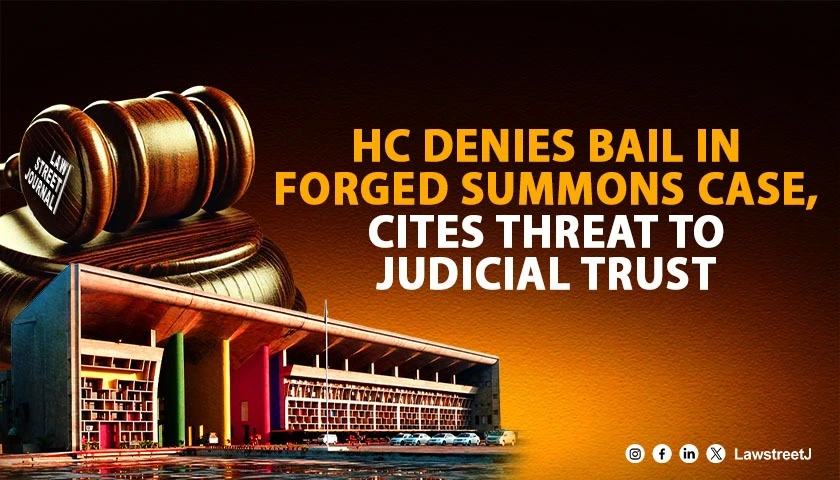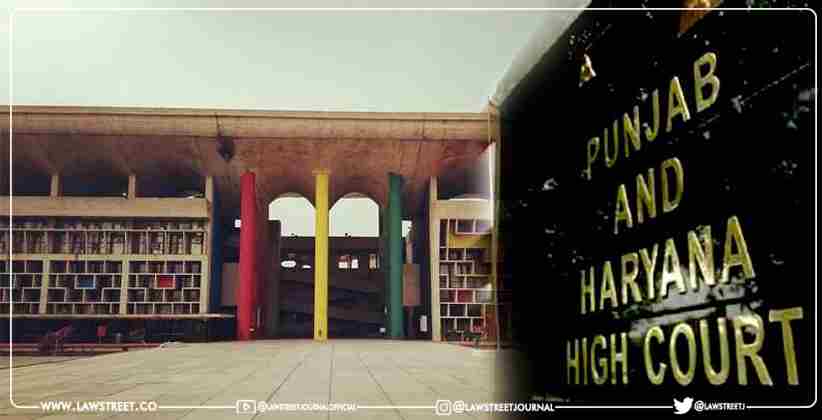Punjab: The Punjab and Haryana High Court has rejected anticipatory bail for a woman accused of fabricating judicial summons, holding that forging court documents strikes at the sanctity of the justice delivery system and cannot be treated lightly, even if parties reach a settlement.
Justice Sumeet Goel dismissed the pre-arrest bail application, emphasizing that such offences “have serious ramifications on public confidence in the judiciary and undermine public trust and faith in the justice delivery system.” The court noted that such acts transcend beyond inter-party disputes and affect the entire judicial institution.
The court addressed CRM-M-37719-2025 filed by Rinku Sharma seeking anticipatory bail in FIR No. 45 dated June 9, 2025, registered at Cyber Crime Police Station, Hisar, for offences under Sections 318(4), 319, 336(3), 337, 340 of the Bharatiya Nyaya Sanhita, 2023, and Section 66-D of the Information Technology Act.
The case originated during the hearing of a bail application before the Additional Sessions Judge, Hisar, when applicant Sunil, aged 46 years, from village Saman, Tohana, District Fatehabad, reported receiving forged judicial summons via WhatsApp from accused Deepak Berwal.
The fabricated summons bore fake court stamps and directed Sunil to appear on June 12, 2025 — a date falling during the summer vacation. The documents falsely claimed that an FIR under Sections 318(4) and 337 of the BNS was registered at Civil Lines Police Station, Hisar, and demanded payment of ₹10 lakh to one Mishi Sharma as maintenance.
Following the complaint, the court sought status reports from the Ahlmad and Station House Officer, Civil Lines, Hisar, who confirmed that no such FIR existed against Sunil. The complainant personally appeared before the court on June 4, 2025, and his sworn statement was recorded.
Examination revealed that the forged summons contained a fictitious UID number, suggesting that the accused had some knowledge of court procedures but made errors that exposed the forgery. The court noted that the fabrication could indicate motives of extortion, revenge, or character assassination.
Investigation established links to a matrimonial dispute between the petitioner and Abhishek, Sunil’s son. The forged summons referenced Mishi Sharma, with whom Abhishek had prior matrimonial discussions, pointing toward possible revenge tactics.
During investigation, co-accused Deepak was arrested on June 26, 2025. His disclosure statement admitted committing the offence in conspiracy with the petitioner, identified as Rinku Sharma alias Mishi Sharma.
Police recovered Deepak’s mobile phone showing WhatsApp messages where he sent the forged summons to Sunil on May 24, 2025. He stated that he acted on the petitioner’s instructions due to the pending marriage dispute between her and Sunil’s son.
Screenshots of WhatsApp chats between the petitioner (using mobile number 99926-27829) and co-accused Deepak were recovered and taken into police possession. The disclosure statement claimed that the petitioner sent the forged summons to Deepak via WhatsApp, who then forwarded it to Sunil.
The petitioner’s counsel argued that she was not named in the FIR and her implication arose solely from the co-accused’s disclosure statement without independent corroboration. The defense contended that such statements are weak and unreliable as the sole basis for prosecution.
The defense also highlighted that the forged summons contained glaring inconsistencies, an incorrect format, a false license number, and a fictitious UID — arguing that as a law graduate, the petitioner would never risk her career by creating such obvious forgeries.
The petitioner claimed she was a victim of continuous sexual exploitation, blackmail, and extortion by Abhishek and her cousin Parveen, for which FIR No. 397/2025 was lodged — suggesting that the present case was a counterblast to prevent her from pursuing lawful remedies.
Crucially, both parties informed the court that an amicable settlement had been reached and requested referral to the Mediation and Conciliation Centre.
However, the court rejected this submission as irrelevant, holding:
“In the considered opinion of this Court, such a submission is of no avail in the present case. The allegations pertain to the preparation and circulation of forged judicial summons, which is a grave offence striking at the very sanctity of the justice delivery system.”
The court emphasized that:
“The offences involved in the instant case transcend beyond the inter se rights of the parties and partake the character of affecting the sanctity of the justice delivery system.”
The court further observed that forging judicial summons “has serious ramifications on public confidence in the judiciary and undermines public trust and faith in the justice delivery system. The factum of parties having entered into a compromise does not dilute the seriousness of the allegations involved.”
The court thereafter held that “even if some compromise has been reached inter se between the parties, the same cannot overshadow the seriousness of the offence or be treated as a valid ground to grant anticipatory bail to the petitioner.”
Addressing broader implications, the court stated:
“The Court cannot be oblivious to the fact that an offence of this nature not only affects the individual but also creates a sense of insecurity in the community at large.”
The court also warned that “granting protection to such offenders at the stage of investigation would send a wrong signal to society and embolden others to indulge in similar unlawful activities.”
It clarified that Section 482 of the BNSS, 2023, “is meant to protect innocent persons from unnecessary harassment and false implication, but the same cannot be extended to those against whom there are prima facie serious allegations supported by material collected during investigation.”
Citing the Supreme Court’s ruling in Sumitha Pradeep v. Arun Kumar C.K., the court rejected the argument that lack of need for custodial interrogation justifies anticipatory bail, noting that this is a “serious misconception of law.”
The court held that “the first and foremost consideration in an anticipatory bail application should be the existence of a prima facie case against the accused,” rather than focusing solely on whether custodial interrogation is required.
The court found that the disclosure statements and recovered screenshots “prima facie point towards the complicity of the petitioner” and “at this stage, such evidence cannot be brushed aside as wholly unreliable.”
It further observed that while the petitioner’s name does not appear in the original FIR, “during the course of investigation, the agency has collected sufficient and cogent evidence linking her with the offence.”
The court noted that the investigation is at a nascent stage and “requires custodial interrogation of the petitioner to trace the origin of the forged documents, examine the devices used, unearth any larger conspiracy, and ascertain the role of each accused.”
Citing State v. Anil Sharma, the court emphasized that “custodial interrogation is qualitatively more elicitation-oriented than questioning a suspect who is well-ensconced with a favourable order under Section 438 of the Code.”
The court concluded that considering “the gravity of the allegations, the nature of the offence, the stage of the investigation, and the necessity of custodial interrogation for a fair and thorough investigation,” the petitioner does not deserve anticipatory bail.
The petition was dismissed with clarification that the observations were made solely for the purpose of deciding the bail application and should not be construed as expressing any opinion on the merits of the investigation.
Ms. Sapna Seth appeared for the petitioner, while Gurmeet Singh (AAG Haryana) and Dr. Pankaj Nanhera represented the complainant.
Case Title: Rinku Sharma vs. State of Haryana




![Police protection to fund manager alleging threat from Kirron Kher & aide: Punjab & Haryana HC [Read Order]](/secure/uploads/2023/12/lj_9007_Police_Kirron_Kher.jpg)
![Most interested witness being the father of deceased, SC upholds acquittal of 6 accused for murder [Read Judgment]](/secure/uploads/2023/12/lj_9904_df2c02a2-d8c5-4dd6-8b58-a59e17b8635b.jpg)
![Supreme Court Collegium approves new Chief Justices for five key High Courts in India [Read Recommendations]](/secure/uploads/2023/12/lj_8000_380d1135-6f3a-4988-a00a-4d5cd5901815.jpg)




